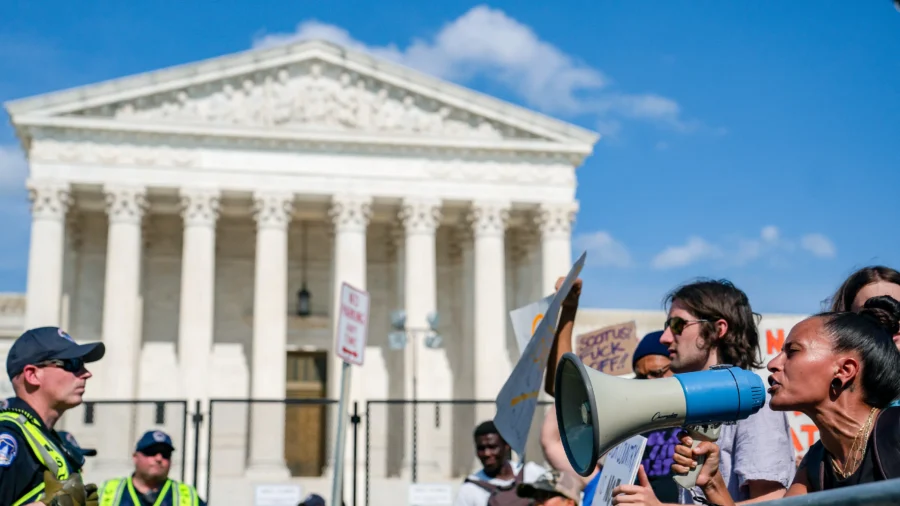The U.S. Supreme Court will start hearing arguments against abortion drug Mifepristone beginning this week, with a decision expected in three months.
The abortion pill challenge concerns mifepristone, one of the two drugs used for medical abortion in the United States. Two cases have been filed—one against Danco Laboratories, which manufactures mifepristone, and the second against the U.S. Food and Drug Administration (FDA). The cases are consolidated into one, with the U.S. Supreme Court set to hear oral arguments in the case on March 26. A decision on the matter is expected around three months later.
Abortion supporters argue that mifepristone has been proven safe and that blocking the drug would harm the interests of millions of women. However, opponents claim that the FDA made two changes related to mifepristone in 2016 and 2021 that removed key safety protocols protecting women.
Mifepristone was approved by the U.S. Food and Drug Administration (FDA) in 2000. In 2016, the FDA extended the drug cutoff date from 49 days of gestation to 70. The agency allowed the drug to be prescribed to women after just a single in-patient visit while blocking the report of nonfatal adverse events related to the medication. In 2021, the FDA allowed mifepristone to be sent by mail.
In April 2023, U.S. District Judge Matthew Kacsmaryk, a Trump appointee, issued a ruling revoking the FDA approval granted to mifepristone after finding that the drug caused trauma among users. Later, the Fifth Circuit court ruled that the FDA failed to consider the side effects of mifepristone as well as harmful consequences that could arise by lowering the drug’s safeguards.
Danco and the FDA approached the U.S. Supreme Court, seeking a review of the Fifth Circuit’s decision.
During the upcoming oral arguments, the Supreme Court will consider several key questions, including whether the Fifth Circuit erred in its ruling and if plaintiffs have standing to challenge the FDA’s 2016 and 2021 actions.
Erin Hawley, senior counsel at the Alliance Defending Freedom (ADF), said that the FDA “betrayed women and girls when it removed the necessary in-person doctor visits that protected women’s health and well-being.” ADF has filed briefs in the case with the Supreme Court.
“The FDA’s own label for abortion drugs says that roughly one in 25 women who take them will end up in the emergency room. Yet the government continues to defend its reckless actions that jeopardize women’s health and safety. Women deserve better, and we look forward to advocating on their behalf at the Supreme Court on March 26.”
Legal Battle
In an amicus curiae brief filed back in January, a coalition of governors argued that if the Fifth Circuit’s decision is allowed to stand, it would bring “harm to women, particularly rural and low-income women.”
“Significantly reducing access to mifepristone will not make patients safer—it will only add extreme burdens to healthcare providers, patients, state medical systems, and those responsible for safeguarding public health and safety, including Governors, without any concomitant improvement in outcomes,” it said.
Meanwhile, 145 congressional members from 36 states have filed a brief opposing access to mifepristone.
“The FDA’s removal of patient safeguards in 2016 and 2021 run contrary to the FDCA’s (Federal Food, Drug, and Cosmetic Act) requirements because these actions further jeopardize patients’ welfare,” the brief said. “Since 2016, the FDA has only required adverse events reporting for deaths resulting from chemical abortion drugs; reporting is otherwise voluntary.”
“This action was not only arbitrary and capricious, but it also raised safety concerns for women seeking chemical abortion drugs,” it stated. “Fundamentally, chemical abortion drugs pose serious health and safety risks to women and girls.”
Jennifer Hendricks, a professor at Colorado Law, points out that pharmaceutical companies are concerned about the case.
“The FDA’s approval of mifepristone stands. But the second-guessing of medical expertise and the FDA’s expertise about medications that the lower courts engaged in was off the charts. That’s one of the reasons why this case has been so prominent,” she said, according to a March 22 post at CU Boulder Today, the campus newsletter of the University of Colorado, Boulder.
“It raises all sorts of concerns about access to abortion. It also makes drug companies wonder about the approval process and what other approved drugs could potentially be questioned or revoked one day.”
The fact that a decision on an abortion drug is coming out during an election year is noteworthy as well.
Thomas Dupree, a former official in the U.S. Department of Justice under former President George W. Bush, believes the Supreme Court justices are “aware of the fact, obviously, that we’re in an election year.”
“But I don’t think the fact that we’re in an election year is going to be driving the outcomes of any of these decisions,” he told Fox News.
While medical abortion supporters claim that the drugs are safe, research indicates otherwise. A 2021 study found that women who took the pills experienced “serious complications.”
“The major complaint at presentation was excessive bleeding (78 percent). Out of 100 patients, 66 percent of cases were diagnosed as incomplete abortion, 6 percent as missed abortion, and 6 percent as unaffected pregnancy,” the study said.
The researchers called for “restriction of the over-the-counter dispensation of abortion pills” to be “strictly implemented.”
From The Epoch Times


